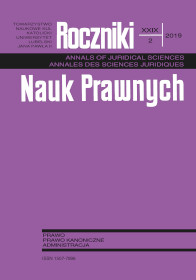Nieważność matrimonium per procura w prawie Kościoła łacińskiego
Małgorzata Tomkiewicz, Invalidity of Matrimonium per Procura in the Law of the Latin Church
Author(s): Lucjan Świto, Małgorzata TomkiewiczSubject(s): Law, Constitution, Jurisprudence, Civil Law
Published by: Towarzystwo Naukowe KUL & Katolicki Uniwersytet Lubelski Jana Pawła II
Keywords: marriage; matrimonial consent; defects of matrimonial consent; invalidity of marriage; matrimonium per procura
Summary/Abstract: Entering into marriage through proxy according to the currently valid canon law is regulated expressis verbis mainly by canon 1105 CCL. It states that for a valid matrimonium per procura it is required that a special power of attorney should be issued for a designated person and that the proxy should be designated by the principal and that they should perform the act by themselves. For the power of attorney to be valid, it has to be signed by the principal as well as by the parish priest or the bishop competent for the place where the power of attorney is issued, or by a priest delegated by either of them, or at least by two witnesses, or it should be drawn up as an authentic document, as required by the state law (canon 1105 § 2 CCL). If the principal cannot write, this must be stated in the document itself and there must be another witness who also signs the document. Otherwise, the power of attorney is invalid (canon 1105 § 3 CCL). If, before entering into marriage on their behalf, the principal revokes the power of attorney or develops a mental disease, the marriage is invalid, although the proxy or the other party may not have known about it (canon 1105 § 4 CCL). The situation in which the matrimonial consent is not expressed personally by the future spouses,but by a proxy (or proxies), makes one ponder on the issue of invalidity of such a marriage. Does the specificity of matrimonium per procura also spread to its invalidity? In other words, do all the factors which make a marriage invalid remain in force in marriage per procura, as such factors generally apply to marriages, or do the factors acquire certain specific features? Or perhaps there are certain elements of invalidity in matrimonium per procura which are typical only to this formula, and if there are, do they not raise any doubts?By analysing the solutions contained in the contemporary internal law of the Roman Catholic Church and the canonical doctrine, the article attempts to answer such questions. Such an attempt has never been made with respect to the 1983 Code of Canon Law.
Journal: Roczniki Nauk Prawnych
- Issue Year: 29/2019
- Issue No: 2
- Page Range: 139-162
- Page Count: 24
- Language: Polish

